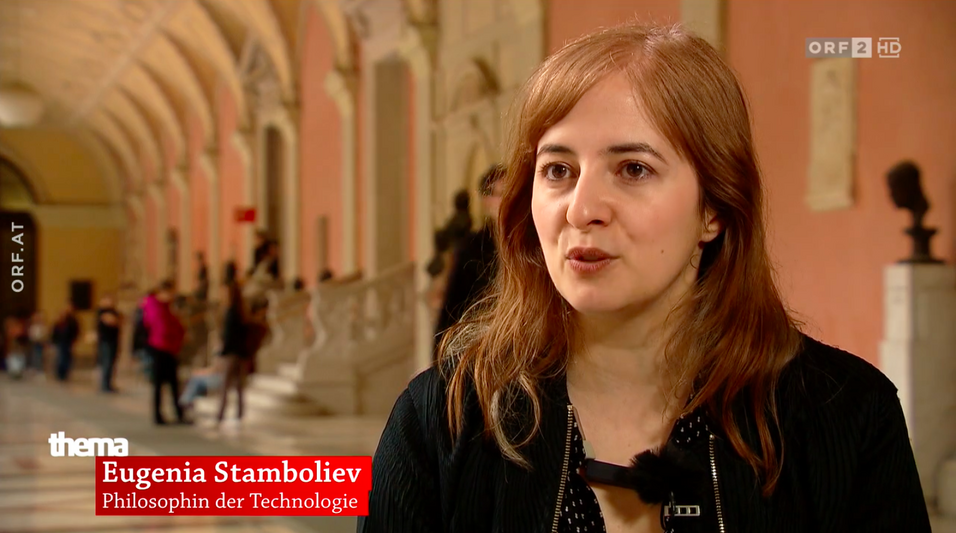Eugenia Stamboliev is a postdoc researcher who works on ethical issues around artificial intelligence and algorithmic/data structures while focusing on political, socioeconomic, and normative concerns. Her project Interpretability and Explainability as Drivers to Democracy focuses on the influence of complex algorithmic structures (like covid models) and democratic concepts and examines conceptual shifts in institutional power, social trust and explainability (XAI).
With her expertise on AI, Eugenia was asked to speak in the ORF programme "Thema" on 24 April 2023 about Artificial Intelligence and the question of whether humans are becoming redundant with its growing importance. ChatGPT works with artificial intelligence and the chatbot was trained with billions of texts from the internet. Through "deep learning", the programme recognises patterns in the texts and thus calculates the answers. Eugenia highlights a critical concern surrounding chatbots - the lack of transparency regarding their inner workings and the sources of information they provide. This issue raises the potential risks of information manipulation, political exploitation, and the emergence of authoritarian regimes or monopolies that wield substantial influence without revealing their true motives or agenda.
Customer service is taken over by programmes with AI. Most professions would not be replaced but could be supplemented. Eugenia emphasizes the potential of streamlining and expediting tasks that are time-consuming and repetitive through automation. By approaching these tasks pragmatically, there is an opportunity to accomplish a significant amount of work efficiently. For programmers specifically, this presents an avenue for development and innovation within specific systems.
Technological progress has historically often been at the expense of the environment. AI is no different. Training a single model produces the same emissions as 300 flights from New York to San Francisco. In the last month alone, over 2000 new AI programmes are said to have entered the market. Eugenia criticizes the worrisome phenomenon of the technology cult prevalent in Silicon Valley, where a homogeneous group of young, well-educated individuals – predominantly white men – determine what is beneficial for humanity. This concentration of power often leads to presumptions about understanding the exact technologies required by society, while overlooking the disparities in access and distribution. Eugenia also highlights the exploitation of workers in click farms, such as those in the Philippines and Kenya, where individuals spend their days sorting through images. This exploitation contradicts the portrayal of technological advancements as achievements while overlooking the human labor behind them. She emphasises the need for regulation in this domain, although the fast-paced nature of technology often outpaces regulatory efforts. However, she acknowledges that Europe is making strides in enacting legislation or recommendations to address these issues and have a tangible impact.
We can use technological progress for ourselves. It is up to us to use technology in such a way that we humans do not fall by the wayside. Eugenia raises concerns about the expansion of economic and social inequalities through technology. She questions the dominance of certain entities in shaping technological developments and highlights how tools like ChatGPT prioritize efficiency and productivity. Eugenia invites reflection on whether this aligns with what humanity truly desires and questions who has consented to this vision of an ostensibly "better" future.

